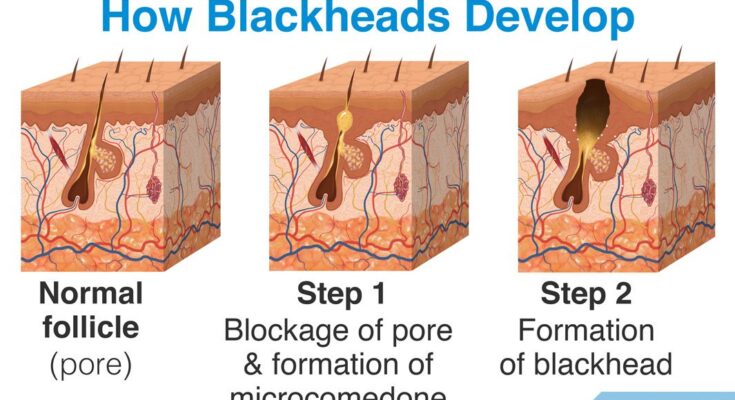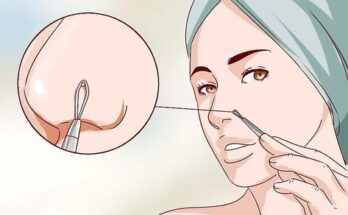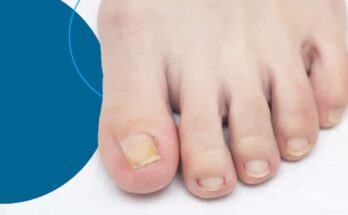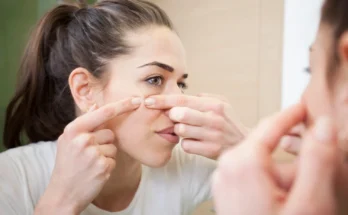Blackheads, the small, dark blemishes that appear when hair follicles are clogged with excess oil, dead skin cells, and bacteria, are a common skin issue that many people seek to remove. However, one practice that often arises in the quest for clearer skin is popping blackheads. While it may seem like a quick fix, dermatologists argue that this method is not only ineffective in the long run but can also cause more harm than good.
The Dangers of Popping Blackheads
- Increased Risk of Infection
Popping blackheads often involves squeezing the skin, which can create microscopic tears in the surface. This provides an entry point for bacteria and other pathogens, increasing the risk of infection. - Scarring
The pressure applied when attempting to pop a blackhead can cause skin trauma, which might result in scarring. These scars can be permanent and more noticeable than the blackhead itself. - Worsening of Acne
Popping blackheads may also push the trapped debris further into the pore, worsening the blockage and leading to more significant pimples or even cystic acne. - Inflammation
The act of squeezing and irritating the skin can inflame the surrounding area, making the blemish appear larger, redder, and more painful.
Why Popping Blackheads Can Be Harmful to Your Skin’s Health
While it might feel satisfying to remove a blackhead manually, the act of popping often compromises the integrity of your skin. The pressure applied when squeezing can damage the surrounding skin and worsen the overall condition of your complexion. Over time, this repeated trauma can even cause permanent skin damage. Moreover, popping can lead to a cycle of constant inflammation, which exacerbates acne and can lead to more blackheads in the future.
Alternatives to Popping: Safe Blackhead Removal Methods
Instead of resorting to squeezing or popping, there are several effective and safer ways to manage blackheads:
- Salicylic Acid
A beta-hydroxy acid (BHA), salicylic acid can penetrate deep into the pores and break down the oil and dead skin cells that lead to blackheads. It’s widely used in over-the-counter cleansers, toners, and spot treatments. - Retinoids
These vitamin A derivatives help to promote cell turnover and prevent clogged pores, which can lead to blackheads. Retinoid treatments can improve skin texture and reduce the appearance of blackheads over time. - Clay Masks
Clay masks, particularly those containing bentonite or kaolin clay, are excellent for drawing out impurities from the skin and absorbing excess oil. These can help minimize the appearance of blackheads, leaving the skin smoother and clearer. - Extraction Tools
If you prefer professional help, dermatologists and estheticians can use specialized extraction tools to remove blackheads safely and effectively, minimizing damage to the skin. - Regular Exfoliation
Gentle exfoliation with physical or chemical exfoliants helps to keep pores clean and reduce the chances of blackheads forming. Exfoliating regularly removes dead skin cells, which are a major contributor to clogged pores. - Facial Steaming
Steaming your face helps open up the pores, making it easier to remove blackheads with the proper tools. After steaming, applying a mask or exfoliant can help eliminate trapped oil and dirt.
The Psychology of Popping Blackheads: Why It’s So Tempting
Despite the risks, many people still feel the urge to pop blackheads. For some, it’s about instant gratification. The act of seeing a blackhead removed can provide a sense of accomplishment, even if it’s short-lived. Others might pop blackheads as a response to stress or anxiety, engaging in the behavior as a coping mechanism.
While the temptation to pop blackheads may seem almost impossible to resist, it’s important to remember that your skin’s long-term health should take precedence over the immediate satisfaction that comes from squeezing out a blemish.
Should You Ever Pop Blackheads?
If you must pop a blackhead, experts recommend taking precautions. The first and foremost rule is to ensure your skin and hands are clean to avoid introducing bacteria. Use a sterilized extraction tool or visit a skincare professional to minimize the risk of damage. However, it’s best to refrain from popping blackheads altogether and focus on treatments that improve your skin’s health over time.
Conclusion: Safe Skin Care Over Quick Fixes
In conclusion, while popping blackheads may seem like a quick and easy solution to clear skin, it often does more harm than good. The risks of scarring, infection, and worsening acne far outweigh the momentary satisfaction of squeezing out a blackhead. Instead, embracing proper skincare routines—such as using salicylic acid, regular exfoliation, and professional extractions—can help keep your skin clear, healthy, and blemish-free in the long run. Resist the urge to pop, and your skin will thank you.



